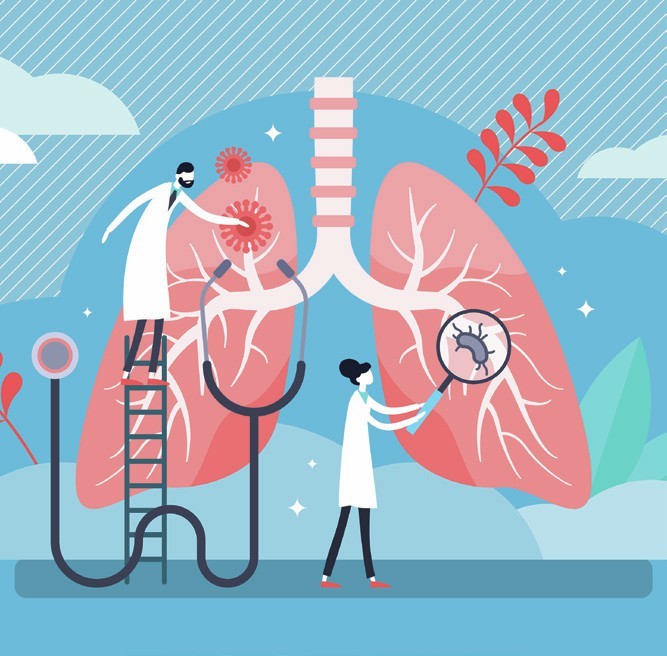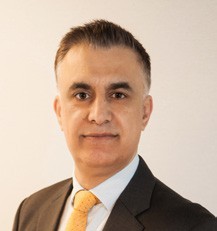EXCLUSIVE INTERVIEW
Helping the world prepare for future pandemics
Pharmafile speaks to Open Orphan
Yamin ‘Mo’ Khan, CEO of Open Orphan, guides us through the respiratory disease arena, and how the world of human challenge trials may help us to understand it better
Pharmafile: How has the global respiratory disease market shifted in the last 10 years?
Yamin ‘Mo’ Khan: Prior to COVID-19, I think it had basically mirrored most of the other therapeutic areas, as there had been growth in the field. COVID-19 has had a significant impact; at one point there were over 300 candidates in development to treat the disease. COVID-19 is such an outlier, and it changes the whole paradigm when it comes to respiratory disease, as well as the development of broader vaccines or antivirals.
On the other side, we have a lot of pressure on pricing as well. That’s one of the key factors that people in pharma and biotech are looking at, especially to see how they can speed up the process of drug development, to offer a lower price for marketing authorisation. That’s going to require more work. Everyone can appreciate and understand that the speed of these vaccines that came out against COVID-19 was amazing. People who are not in the industry don’t fully appreciate the speed at which the work was done.
Typically, it takes eight to twelve years to come up with a new product on the market. With COVID-19, the teamwork across the different kinds of groups internationally was amazing. From the discovery of the virus in Wuhan, different academics, sites, and pharma companies like Pfizer and Oxford- AstraZeneca, came together to expedite response to COVID-19. The regulatory bodies were happy to review the data on a rolling basis, which was not very common.
I think that part has been pretty amazing, and hopefully it goes some way towards putting together a blueprint for future epidemics and pandemics. I’m hoping that we will be better prepared next time. I think there was some criticism at the start – a lot of people talked about a potential pandemic and why we weren’t better prepared for this one.
What potential do human challenge studies have in helping us understand more about respiratory diseases?
When you want to run a challenge trial, you find healthy volunteers – usually young, healthy people. We will find around 160,000 unique volunteer leads this year to fill our studies. For our challenge studies, we offer a number of strains of influenza, RSV, coronavirus, malaria, and so on. There’s a long process of checking volunteer eligibility to participate in trials. For example, if you were a volunteer, we would do a serology test. We need to make sure that with an influenza challenge trial, you’ve not been exposed to that strain before, so you wouldn’t have antibodies for that. If you don’t have innate antibodies, you will get infected, but if you don’t get infected, you’re not really that useful to the trial. We do those kinds of screening processes, which means that we lose about 85% of the volunteers because they’re not suitable.
We would first give vaccines to the ones that are most suitable, and then two to four weeks later, we would challenge them with a live virus. Then we measure the signs and symptoms while they quarantine for ten days. These challenge drug trials have been done quite often in the past, but with the current pandemic, it has been brought to a higher level. We are now seeing more and more emphasis on doing challenge trials. WHO, for example, has put forward new working guidelines on how challenge trials should be conducted. There have been discussions at the highest levels in the US, at the FDA, regarding challenge trials. We work with the MHRA here in the UK in getting every challenge trial approved. We also work with some of the key academics – for example, Imperial College London was involved in the COVID-19 trials that we ran. Remember, we know the exact point we inoculate a volunteer, and we know to the second when a patient gets infected.
As CEO of Open Orphan, are there any particular hopes and visions you have for the company in 2022, as well as for the respiratory disease space?
There’s no other company that has the breadth of challenge models we have. We have over nine challenge models and have done over 60 challenge studies, so it does put us in a unique situation. We also have a fantastic scientific team, with consultants from CMC through to clinical. With regards to respiratory, on a small scale, we started working on asthma, using HRV as an agent. We’ve developed a chronic obstructive pulmonary disease (COPD) model, but globally, we want to help the world to be better placed in fighting a future pandemic. We can’t just be doing trials on a day-to-day basis – we need to look at the long term and see what the key risks are for all of us as a global community.
As a company, developing new challenge trials all the time is something we invest in. We ran the first SARS-CoV-2 challenge trial, and the results of that were published in Nature Medicine in April. We are also working with some key academic leaders as well, to develop this model to make them better and faster. We were able to grow the company with the challenge agents and the new service portfolio, and are helping prepare for any future pandemics.
What are the main obstacles that arise in human challenge studies?
Recruitment: trying to find a sufficient number of healthy volunteers is a huge challenge. We have a large dedicated recruitment arm called FluCamp, which advertises via social media and traditional press to recruit potential volunteers. These people are compensated when they go into quarantine, but I think that’s one of the key challenges. The other challenge is that for Phase I studies in respiratory using healthy volunteers, they require nurses and physicians with specialised skill sets. That’s different to the standard indication. When doing trials with respiratory disease patients, there’s more sampling and specialist procedures required. Doing multi-site trials in respiratory does increase the variability of data across the site. You avoid that in a challenge trial because this tends to be conducted at a single site. You have one site, one group of nurses, and one group of physicians, who do all the patient procedures and sampling. So there is less variability of data.

What is the potential of technology in human challenge studies?
Technology has changed, and will continue to change the way clinical trials are run. Let’s talk about patient-reported outcomes, when a patient is taking part in a clinical trial. With technology, you know in real time when data is being entered into the electronic diary. This increases the data integrity and the data quality. It also shortens the timelines for analysis, and gives the ability to collect more data. You have to ensure you only collect the data you really need. Technology enables you to get more data than otherwise possible in paper.
At Open Orphan, we run clinical trial challenge studies with wearables as well. We collect data on the patient 24/7. We analyse the correlation between the variable data versus the signs and symptoms the patient is showing. When a patient is at home, you can continue to collect the data. We have more kinds of clinically-targeted wearable devices to collect this.
COVID-19 illuminated the need for safe treatments that manage the inflammatory responses to respiratory infections. What else did the pandemic highlight about respiratory diseases?
I think it highlighted the potential for new treatments. The use of high quality placebo trials to test treatments has been key. Even though we expedited the clinical development programmes for the COVID-19 vaccines, they’ve been shown to be safe and effective. Understanding the viral disease helps with regard to what treatments to test, and also deciding to target the underlying cause of disease, in the right population, at the right time, is key. For example, it was shown that dexamethasone is beneficial in more severe patients, but not so much in the mild-to-moderate COVID-19 disease. Identifying infection early on in at-risk groups was also important, of course. It did show that in a lot of cases, in the at-risk patient population, late treatments were frequently unsuccessful. With patients who are elderly or at risk, if they develop severe flu, it’s harder for them to recover.
At Open Orphan, we are now testing antivirals and immunomodulator treatments, as well as prophylactic drugs. We are currently using viral-induced studies in Africa, and hope to do more studies in COPD. I think those are some of the key findings.

Yamin ‘Mo’ Khan is CEO at Open Orphan with over 25 years of experience in clinical research and the CRO industry. Mo previously worked as a Consultant assisting CROs to develop growth strategies, and also held a variety of senior roles at Pharm-Olam. In his time at Pharm-Olam Mo had leading roles in Clinical Operations, Project Management, Business Development and Executive Management functions.